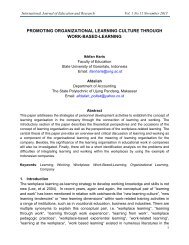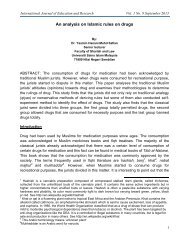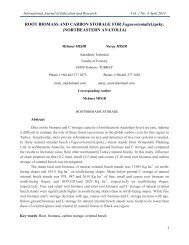A Special Case of Pathetic Fallacy: Papini's Picasso - International ...
A Special Case of Pathetic Fallacy: Papini's Picasso - International ...
A Special Case of Pathetic Fallacy: Papini's Picasso - International ...
You also want an ePaper? Increase the reach of your titles
YUMPU automatically turns print PDFs into web optimized ePapers that Google loves.
ISSN: 2201-6333 (Print) ISSN: 2201-6740 (Online)<br />
www.ijern.com<br />
“apostle, prophet, messiah” (Papini, 1924, p. 254) or “leader, guide, center”(Papini, 1924, p. 165) or<br />
again “prophet <strong>of</strong> a religion, […], redeemer <strong>of</strong> souls” (Papini, 1924, p. 165). And the way Papini<br />
chooses to use <strong>Picasso</strong>'s image is by no means a negative one, since the Italian author had not the<br />
same moral commitment to society as most people do.<br />
But what if Papini was speaking <strong>of</strong> himself rather than <strong>of</strong> <strong>Picasso</strong>? What then? It would be a<br />
certain case <strong>of</strong> the fallacy Ruskin defined? This problem becomes even more intriguing when,<br />
following the lines from The failure, we find that Papini was afraid <strong>of</strong> being under somebody else's<br />
influence, “afraid that someone will speak through” his “mouth” (Papini, 1924, p. 261). He even<br />
admits a strange possibility<br />
When I am speaking I do not know whether the words come from my own brain or from<br />
some hideous prompter crouching behind my back. (Papini, 1924, p. 261)<br />
He goes even further when fearing that it is not him who thinks and dreams, “but the c<strong>of</strong>fee,<br />
the tea, the wine, the oxygen,” or even “the music” (Papini, 1924, p. 264). Is this only rhetoric? We<br />
might consider that way, since he dismisses as “stupid fear” his debt towards the “red and white<br />
liquids” that he pours into his stomach (Papini, 1924, p. 264).<br />
We have a man submitted to so many influences to the point he does not recognize himself<br />
anymore. He wants to find himself, searching for the “ultimate residuum” <strong>of</strong> his individuality, but<br />
he finds himself condemned to “always live as a stranger” “with this Self, bound, dressed, wrapped,<br />
cluttered up by others” (Papini, 1924, p. 265). Is he really Papini? Or is it just a beautiful literary<br />
exercise <strong>of</strong> proving what personalism as an existential option is for the individual? Whatever would<br />
be the answer, the situation reminds me <strong>of</strong> our previous discussion over the incapacity <strong>of</strong> taking <strong>of</strong>f<br />
the mask we are wearing, even when nobody looks at us. Nobody? We are looking, and that is<br />
enough.<br />
To make him one <strong>of</strong> the “weaker” men, “overborne by weaker things” is to shrink Papini to<br />
the dimensions <strong>of</strong> “easily-gulled simpletons and so-called experts” who took the “nonsensical<br />
mystification” as “gospel” as Pierre Daix warns us about the so-called interview (Daix, as cited in<br />
Gale, March 24, 1994).<br />
Instead we should try to understand, for example, what was his opinion on buffoons, on<br />
mountebanks, since he considers as so not only <strong>Picasso</strong>, but also “Homer and Cervantes,<br />
Shakespeare and Dostoievski” <strong>of</strong> whom he admits that they “have brightened our<br />
childhood”(Papini, 1924, p. 268). Even though he thinks that<br />
men must be amused and made to laugh – that a good story will keep them awake [...] till<br />
you can reach their minds with a good idea and fool them into swallowing a great truth<br />
(Papini, 1924, p. 267).<br />
he “refuse(s) to play buffoon to any one” (Papini, 1924, p. 267). He allows <strong>Picasso</strong> to do that at will,<br />
and this should not be shocking for anybody's ears, even if we think <strong>Picasso</strong> really said the words,<br />
because one undisputed quote <strong>of</strong> <strong>Picasso</strong> says that<br />
We all know that art is not truth. Art is a lie that makes us realize truth, at least the truth that<br />
is given us to understand. The artist must know the manner whereby to convince others <strong>of</strong><br />
8





